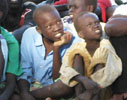
Last week Sudan’s two main parties, the ruling NCP and its southern counterpart the SPLM, reached a major deal on the allocation of parliamentary seats. The two parties agreed on giving the South 40 extra seats, or, 27 percent of Sudan’s parliament.
This careful number falls below 28 percent, the number of seats awarded to the South’s ruling party under the 2005 peace deal, but just above 26 percent, the number of votes needed to block any attempts by the NCP to amend the constitution. In other words, come April, the new southern bloc voted into parliament will have the power to bar any NCP attempt at writing the referendum out of the constitution. The deal also allocated extra seats to two oil-rich border regions, Abyei and Southern Kordofan.
This 27 percent compromise may also be the start to resolving the longstanding census dispute between North and South, with the two sides arguing over the true population figure for South Sudan. Census results released last year calculated that the South’s population was only 21 percent of Sudan’s population—a number highly disputed by the southern government, who insisted that the South made up a third of the total population. One reason why this number was so significant was that the population proportion would translate into the proportion of seats, or political power, the South would be given. Now that the two parties have essentially reached an agreement on power-sharing, it remains to be seen whether the magical 27 percent will become the de facto number used for the census, and thus for other issues of consequence—i.e. determining the outcome of the referendum vote.
On a larger scale, the 27 percent compromise represents continued deal-making at the elite NCP-SPLM level. While this behind-the-door bargaining may offer short-term peace and stability for the country, it also means that the two parties have entered into a pact of maintaining each other’s respective political monopolies—a distasteful and unsustainable outcome for a Sudanese population whose varied opinions and priorities cannot possibly be encompassed within two political agendas.
Other signs point clearly to the two parties’ determination to remain not only in power, but be the only ones in power. A report issued by Human Rights Watch in January documented widespread oppression and harassment of political opposition by both the NCP and the SPLM. In a letter sent yesterday to the E.U. Election Observation Mission to Sudan, Human Rights Watch said that without looking at “entire human rights situation and how it is affecting the elections environment,” observers would not be doing their jobs right. In other words, let’s take a step back, look at the entire situation, and remember that whatever agreements are made, it’s ultimately about the 41,347,723 (this number is probably disputed too) Sudanese people.
Photo: Children from Sudan’s volatile Abyei region

